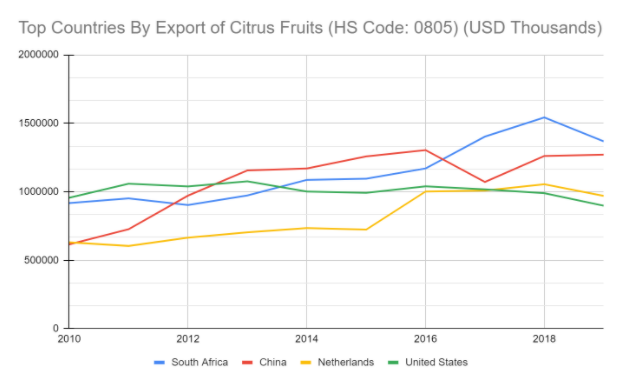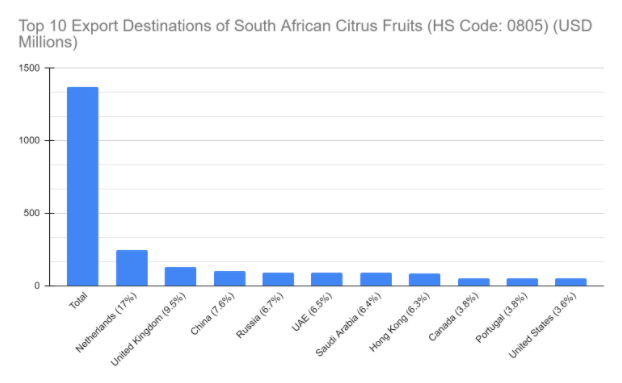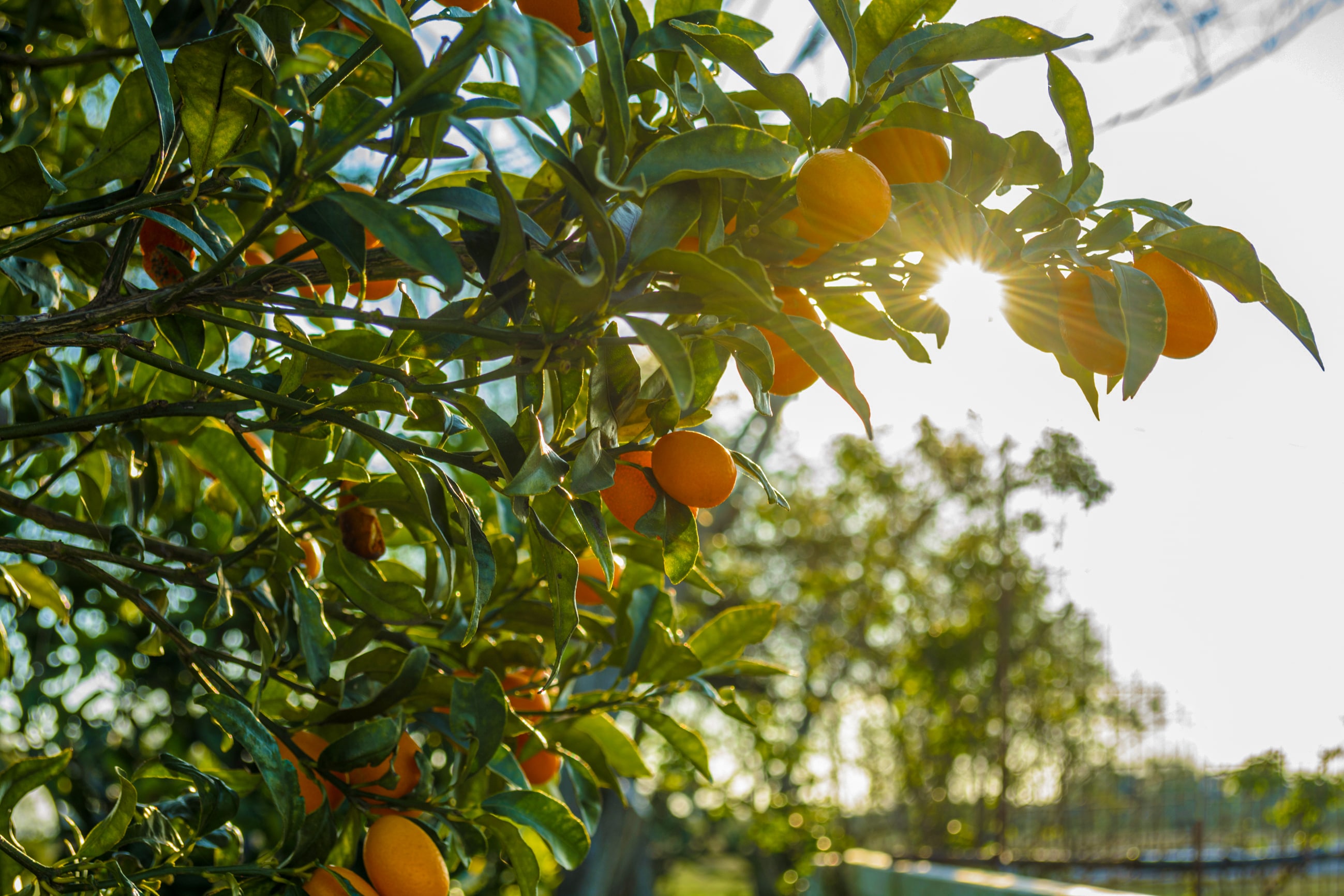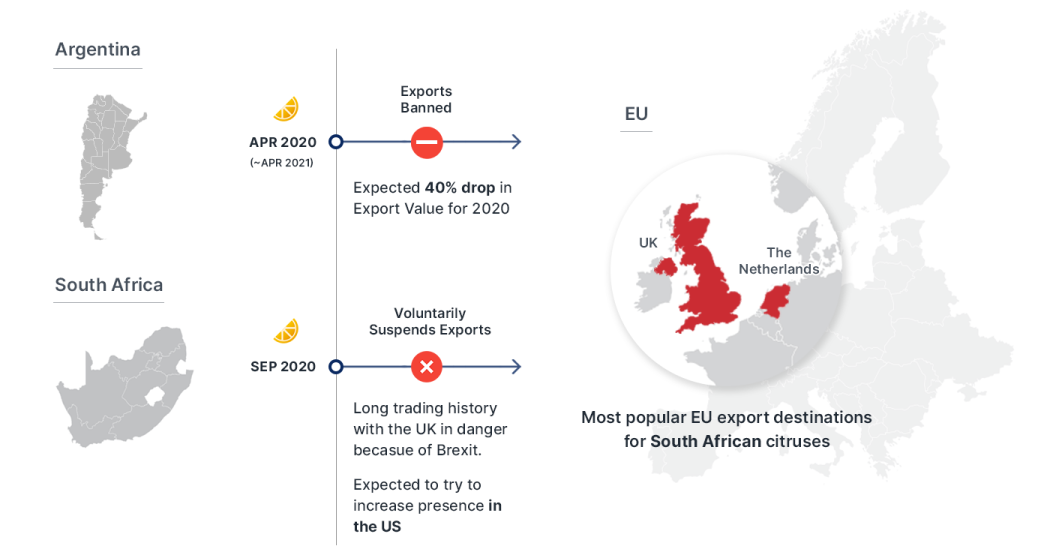South Africa Suspends Citrus Exports to EU after the Discovery of Pest Infections
South Africa’s Citrus Fruit Industry
The South African citrus fruit sector is one of the country’s most important agricultural industries as well as one of the most popular citrus markets in the world. Since 2014, South Africa has become one of six countries in the world to export more than USD one billion worth of citrus fruits annually, and in 2017, it surpassed China, the Netherlands, and the United States to become the second largest exporter of citrus in the world only behind Spain, commanding a 9.8% of global export share by 2019. Citrus fruit itself is an extremely popular agricultural item; in 2019, it reached a worldwide export value of USD 13 billion.

Source: ITC Trade Map (HS: 0805)
The two most popular export destinations of South African citrus fruits are the Netherlands and the United Kingdom, which both share South African citrus import values over USD 100 million. South Africa is the EU’s largest trading partner in Africa, and the African country has enjoyed a long history of established trade relationships with the UK pre-Brexit.

Source: ITC Trade Map (HS: 0805)
The Spread of the Infection
In late August 2020, indicators of false codling moth (FCM) infestations were detected on citrus fruit harvests. FCM refers to a common citrus pest whose larvae invade the flesh of fruits, thereby compromising their insides while also making them more susceptible to disease, mold, and further infestations. Intervention immediately took place. South Africa wields a False Codling Moth Management System, a creation inspired by a separate 2018 incident when FCM infestations breached local crops. The existence of the system allowed South African management to tackle harvests early, initially limiting its spread. The FCM was found only in oranges, as other citrus fruits, such as grapefruits and lemons, are incapable of hosting FCM.

However, citrus production was also affected by an additional, separate infection, citrus black spot (CBS). CBS is a common citrus fungal disease that causes undesirable hard spot lesions to occur on the surface of fruits. The prevalence of both FCM and CBS at the same time greatly compromised citrus harvests that, on September 12, South Africa decided to voluntarily ban exports from certain producing regions to major EU trading partners. The primary objective of the suspension was to exclude potential interceptions of CBS-symptomatic fruit as to not cause major damage to the EU market.
Precedent in Argentina
It is also possible that the voluntary South African suspension was a preemptive move in response to a similar situation that occurred in Argentina mid-August. Traces of CBS were also found in Argentinian citrus fruits, and as a result, the EU implemented a ban on Argentinian citrus imports starting from August 16, 2020 until April 30, 2021. According to Nicolas Carlino, a citrus producer of Monte Caseros and secretary of the agricultural organization San Francisco Cooperative, the Argentinian citrus industry is expected to lose up to 40 percent of 2019’s recorded export value across the 2020 season, a prediction that falls in line with the fact that the EU is Argentina’s most important market for exporting citrus fruits.
As the EU is also one of South Africa’s most important export destinations, the implementation of the voluntary suspension may likely be an initiative by South Africa to control the terms of trade and mitigate any damages that could parallel what was seen within the Argentinian market.

Moving Forward
Argentina has already begun to look at other potential markets within Southeast Asia and the Middle East. However, one particular buyer that both Argentina and South Africa have been eyeing is the United States. Despite the US being the largest importer of citrus fruits in the world, neither Argentina nor South Africa exported any value larger than USD 80 million to the western country prior to 2020. The US citrus market is currently dominated by Mexico, Chile, and Peru, which altogether held an 80 percent market share of the US’ total citrus imports in 2019.
Even before suspensions, South Africa had already begun to increase its exports to the United States in 2020, exporting about 60,000 MT from January to August, a 9 percent increase from 2019 numbers. As citrus fruits are often associated with a myriad of health benefits, demand for the produce also increased by 84 percent in March 2020 compared to the year before due to COVID-19 fears.

It is likely that South Africa will attempt to establish a greater presence and relationship with the United States, especially considering that, even when the suspension is lifted, the future of South Africa’s relationship with the UK lies in uncertainty thanks to Brexit. The South Africa Custom Union Countries with Mozambique and United Kingdom Economic Partnership Agreement (SACUM-UK EPA), a type of free trade agreement that would essentially allow South Africa to continue its beneficial trade relationship with the UK post-Brexit, still requires an agreement between the EU and the UK within their ongoing trade discussions. If no agreement is established, South Africa would then be subject to World Trade Organization regulations, which in turn would greatly complicate the uncertainty and jeopardize the trade benefits regarding the provisions listed in SACUM-UK EPA.
Sources
Tridge. Insights.
ITC World Trade Map. HS Code: 0805.
Americafruit. “South Africa set for US citrus high.”
Fresh Fruit Portal. “South African citrus exports to the US pushed to new highs by Covid-19.”
Fresh Fruit Portal. “South Africa to suspend some citrus exports to the EU.”
The Conversation. “Here’s why South Africa and its neighbours are anxious about EU and UK post-Brexit trade talks.”

